CALHOUN RADIO DAZE - Calhoun Almost Got A Radio Station Twice, Settled For Illegal Stations, PDQ in Grantsville, WHUR In Hur
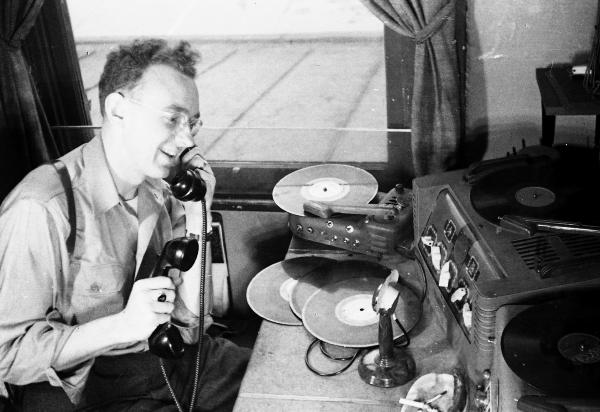
David Hathaway developed an illegal radio station
in Grantsville (PDQ) during his high school years
at Calhoun County High School about 1942
By Bob Weaver
Calhoun has a lot of almosts.
We almost got an Interstate highway.
We almost got a stoplight.
We almost got a real radio station, twice.
Then, we had a couple of illegal AM radio operations.
Now, in the 21st Century, we almost got included in a multi-county recreational ATV trail, but got dropped, and after a 20 year effort, we've almost got a Dark Skies astronomy park grant.
Well, Calhoun did get the ARC grant, but it was taken away. Can your believe?
We have yet, despite numbers of politicians announcing it will be here soon, to get real-life broadband and cell service.
The first official attempt was in the 1960s when Henry Woodyard and associates of Woodyard Newspapers of Spencer optioned the Albert and Gladys Stump land below Grantsville for a station.
The FCC denied Woodyard's application for the Spencer and Grantsville stations because of his newspaper interests.
More recently, a Sutton WV broadcaster purchased the last WV FM radio frequencies in the state for the Arnoldsburg area, announcing an expansion of his radio chain. He then backed out.
That leaves, for historical purposes, the tales of two illegal, undercover, fledgling stations.
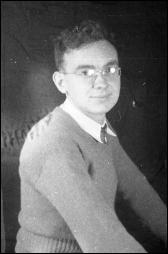 An early 1940s effort in Grantsville by high school student David Barr Hathaway, and 15 years later in 1950s at Hur WV, by yours truly.
An early 1940s effort in Grantsville by high school student David Barr Hathaway, and 15 years later in 1950s at Hur WV, by yours truly.
David passed away in 2009 at age 84.
"David started the station with the help of his buddies, putting it in a chicken coup behind his house on Main Street," recalls 82-year-old friend Jim Hardman.
"The folks at Thompson's Drug Store tuned in faithfully every evening and on the weekends, listening to the tunes and banter," Hardman said, always questioning the origins of the signal.
The stations call letters were PDQ, and most of the broadcasting was from 78 rpm records and transcriptions recorded by Hathaway and crew. We have some of that recorded programming, being donated to the Calhoun Historical Society and the Hur Herald Archives at Glenville State College.
David's son, Mark Hathaway, says the original discs of the programming are very fragile.
Hathaway, a man of many seasons, was part of a make-do generation in Calhoun that promoted creativity and adventure with few resources, not unlike the rocket boys of the county a few years later.
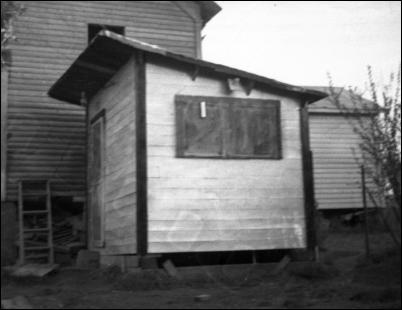
Hathaway's radio station was in a chicken
coup, emitting a signal around Grantsville
The 20th Century was a rapidly changing time, with the telephone, movies, the record player, the vacuum tube, radio, tape recorders.
Yet to come was TV, transistors, micro-chips, video games, the Internet, cell phones and dozens of things spawned in the computer age.
It was a time in America that radio connected and entertained even the poorest farm family.
Few will remember finely tuning AM broadcasts coming from tabletop and wooden console radios, centerpieces in the family living room.
The signal would fade in and out, or be disturbed by noisy static from a thunderstorm 75 miles away.
The radios were powered by wet or dry cell batteries, but a few families along the main electric line to Grantsville could plug their radio into the socket.
Families would huddle on the floor or sit on the couch under the dim gaslights to hear country music, dramas and the news.
Calhoun families fixed their ears to evening news programs to the latest from World War II battlegrounds, with hundreds of Calhoun men serving.
You could hear Hathaway's radio station all over Grantsville. "He even had a sponsor, Francis Hardware and the drug stores," said contemporary Von Yoak.
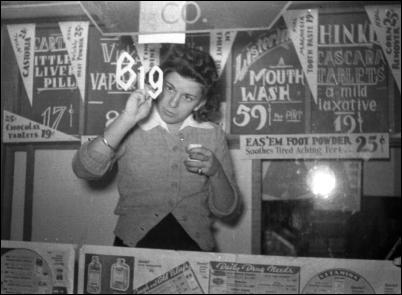
Thompson Drug store folks, including this
gal, were amazed by the unknown entertainment
Hardman said Hathaway and neighborhood boys also had their own telegraph system in town, with wires going house to house, using a telegraph key and Morse Code.
"Dave, George Smith, George Bell, Tuck Elliott and others, learned the code," he said.
"The whole radio project was pretty short-lived because of concerns about getting caught running an unlicensed radio station," said Hathaway's son Mark, and World War II was taking hundreds of Calhoun boys and men to fight that great war.
David, an accomplished musician, was a decorated Purple Heart recipient who attended West Virginia University on the GI Bill, where he earned two bachelor's degrees and an MA before moving to Columbus in 1956 to work for the Franklin County Schools.
He served first as a school psychologist and later as Assistant Superintendent, retiring after 31 years.
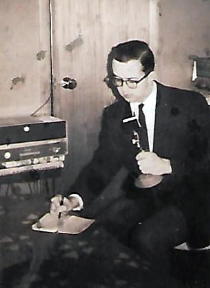
The Hur radio station in the 1950s was a little more sophisticated, operating illegally in Bob Weaver's (shown right) cellar house.
There was an actual home-constructed control board, pre-amplifiers, a record and tape player.
Not only could you hear the AM station in the Village of Hur, but on some days out the Husk Ridge. Unfortunately, where the signal reached, no one lived to enjoy the entertainment. You could pick it up on a car radio.
With some live DJ'ing mixed with some popular tunes, the listeners had little interest until the format went gospel.
During high school in the 1950s, we briefly relocated the transmitter to the roof of the old Calhoun High School, without notification to the principal. Such actions today would be considered a terrorist act, with the offenders being suspended from school and headed to juvie court.
The fledgling radio station launched my professional career into radio broadcasting in Marietta OH and Spencer, a career which lasted a couple years, dropping out because of the starvation wages.
Shortly after graduation and some college, a real radio career was lunched at WMOA in Marietta OH, becoming a radio flunky of all talents. The station was located in a 'tall' bank building downtown, the station being on the fourth floor.
While DJ'ing at night, it was pretty lonely being the only person in the building, but I entertained myself by dropping a basket on a rope down to street level to have my buddies place a six-pack, hoisted up the side of the building to be consumed for an attitude adjustment.
It was here I started becoming a fledgling alcoholic.
The studio was not sound proofed, and a daily train whistle would drown out the reading of the news. There was a small staff, returning one evening to the studio I heard the announcer reading the news. Looking into the control room, he was not there.
Walking into the control room, I noticed the mike cord going into a small rest room, the door closed. Opening the door, Mr. Curtis was reading the news sitting on the commode, at which time I reached over and flushed it.
I think most listeners recognized the sound.
Leaving WMOA, I came to Spencer to help put WSPZ (WVRC) on the air in 1961, having a short-lived career, with a relatively high skill level in electronics. Now, with the changing technology, I'm at the bottom.
Radio was a coming-of-age experience, meeting and working with many personalities, writing news, radio commercials, and even DJing a little.